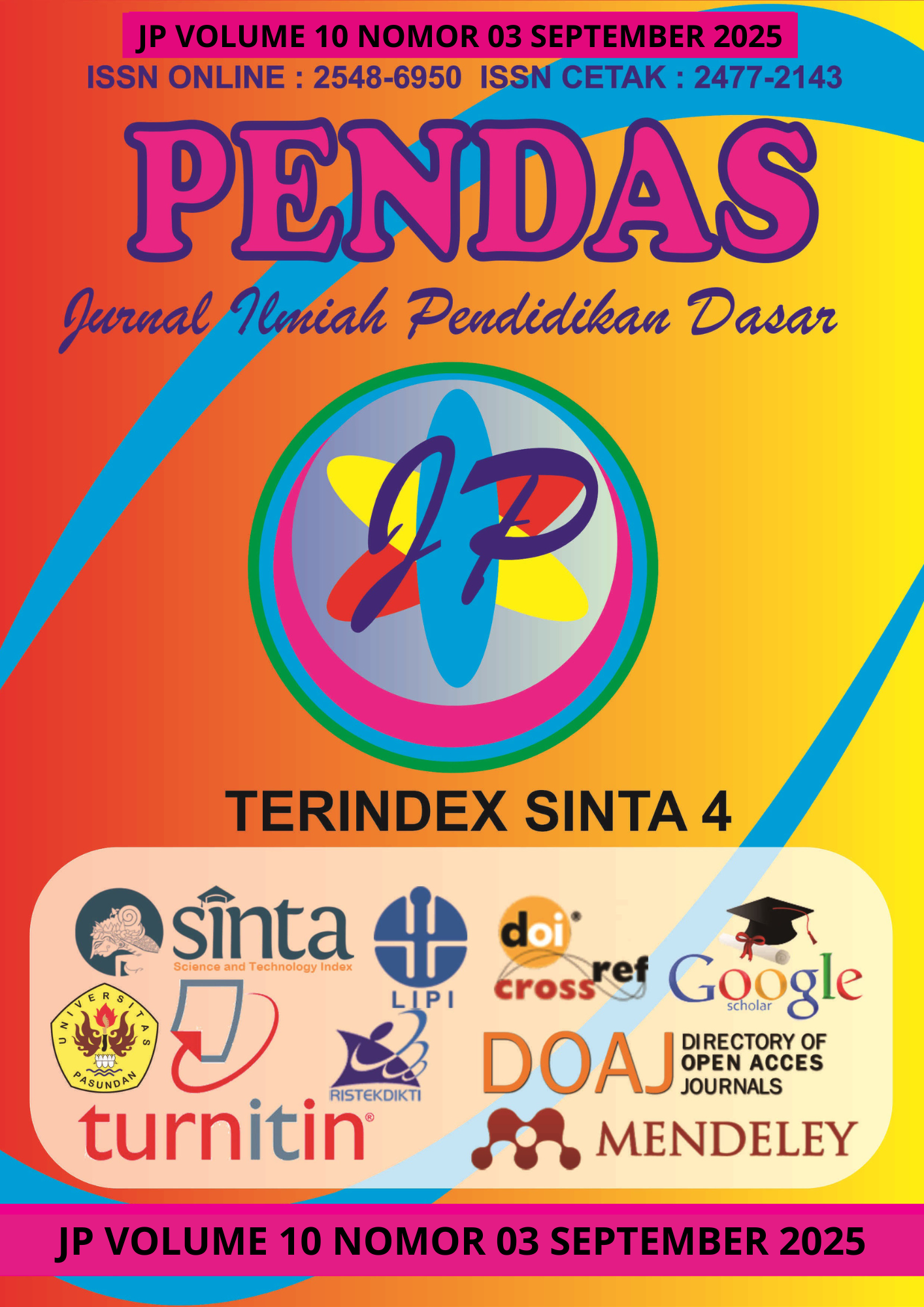EFEKTIFITAS PENGGUNAAN METODE FLIPPED CLASSROOM DENGAN PENDEKATAN KOOPERATIF LEARNING UNTUK PEMBELAJARAN MAHARAH ISTIMA’ PADA SISWA SMP ISLAM HASANUDDIN MALANG
DOI:
https://doi.org/10.23969/jp.v10i03.28757Keywords:
Effectiveness, Flipped Classroom Method, Cooperative Learning, Listening SkillsAbstract
Listening instruction at SMP Islam Hasanuddin Malang still relies on traditional, teacher-centered methods, resulting in low student engagement and underutilization of technology. The aim of this study is to investigate the implementation of the flipped classroom method combined with a cooperative learning approach in teaching listening skills, and to evaluate its effectiveness for students at SMP Islam Hasanuddin Malang. This study adopts a quantitative approach and employs an experimental research method. Data collection techniques include observation, documentation, and testing. Data analysis involves normality testing, homogeneity testing, and hypothesis testing using the SPSS 21 software. The findings indicate that the implementation of the flipped classroom method with a cooperative learning approach in teaching listening skills consists of several stages: the teacher prepares learning materials in the form of Arabic audio recordings and distributes them for students to study independently at home. During face-to-face sessions, the teacher reviews the material with the students. Students work in small groups to discuss the content, complete exercises based on the audio texts, and share their understanding with their peers. Evaluation is conducted both individually and in groups, with dedicated sessions for self-reflection. The use of the flipped classroom method with a cooperative learning approach has been proven effective in teaching listening skills. This is supported by a statistical significance value of sig = 0.000, which is less than 0.05. Therefore, the null hypothesis (Ho) is rejected, and the alternative hypothesis (Ha) is accepted.
Downloads
References
Andeka, W., Yulia D., & Agus S., (2021). “Analisis Faktor-Faktor Yang Mempengaruhi Motivasi Belajar Siswa Sdn 04 Sitiung.” Consilium: Education and Counseling Journal 1 (2): 193. https://doi.org/10.36841/consilium.v1i2.1179.
Darmawati, N W S. (2022). “Model Pembelajaran Inovatif Bahasa Indonesia Berbasis Flipped Classroom Pada Era Digital Dengan Pemanfaatan Google Classroom.” Jurnal Pendidikan Dan Pembelajaran Bahasa Indonesia 11 (2): 168–77.
Fakhri, M. M. (2023). “Dampak Penerapan Flipped Classroom Terhadap Pengetahuan, Keterampilan, Dan Keterlibatan Mahasiswa Dalam Pembelajaran.” Jurnal Ilmiah Edutic : Pendidikan Dan Informatika 9 (2): 127–38. https://doi.org/10.21107/edutic.v9i2.18353.
Fauzan, M., (2021). “Penerapan Elaborasi Model Flipped Classroom Dan Media Google Classroom Sebagai Solusi Pembelajaran Bahasa Indonesia Abad 21.” DWIJA CENDEKIA: Jurnal Riset Pedagogik 5 (2): 361. https://doi.org/10.20961/jdc.v5i2.55779.
Ida, F., & Anna., M., (2021). “Validitas Dan Reliabilitas Dalam Analisis Butir Soal.” Al-Mu’Arrib: Journal of Arabic Education 1 (1): 34–44. https://doi.org/10.32923/al-muarrib.v1i1.2100.
Kinteki, R. (2020). “Model Pembelajaran Flipped Classroom Untuk Generasi Milenial.” Repositori. Kemenbdikbudristek, 7.
Kurjum, M., Leily I., F., & Fairuz., D. (2022). “Desain Pembelajaran Flipped Classroom Dengan Model Pembelajaran Bela H. Banathy Di Lembaga Pendidikan Islam.” ZAHRA: Research And Tought Elmentary School Of Islam Journal 3 (2): 159–66.
Maghfirotunnisa, A., et al. 2023. “Validitas Isi Dan Reliabilitas Instrumen Penilaian Harian Mata Pelajaran Bahasa Arab MI Manarul Islam Malang.” Shaut Al Arabiyyah 11 (1): 19–28. https://doi.org/10.24252/saa.v11i1.34368.
Maslamah, M., & Muhammad Nur K., (2022). “Al-Ta’lim Al-Maqlub Li Maharah Al-Istima’ Wa Al-Kalam Bi Istikhdam Telegram Lada Thulab Al-Jamiah.” Jurnal Al Bayan: Jurnal Jurusan Pendidikan Bahasa Arab 14 (1): 191–206. https://doi.org/10.24042/albayan.v14i1.11233.
Muhamad., F., (2018). “PEMBELAJARAN MAHARAH ISTIMA’.” Jurnal Komunikasi Dan Pendidikan Islam 11 (1): 1–14.
Naili. T., M., & Syaifullah. (2024). “Efektifitas Metode Resitasi Terhadap Peningkatan Keaktifan Belajar Bahasa Arab.” Tasyri` : Jurnal Tarbiyah-Syari`ah-Islamiyah 31 (1): 114–24. https://doi.org/10.52166/tasyri.v31i01.563.
Nurfadhila, U., (2019). “Penggunaan Model Flipped Classroom Dalam Meningkatkan Keterampilan Berbicara Bahasa Arab Siswa.” Maharat: Jurnal Pendidikan Bahasa Arab 2 (1): 19–28. https://doi.org/10.18196/mht.2114.
Olvianti, M., F., Jarmani, & Endang., S. (2024). “Pengaruh Implementasi Metode Pembelajaran Learning Contract Terhadap Pendidikan Karakter Dan Kedisiplinan Siswa Kelas 5 Sekolah Dasar.” Jurnal Pendidikan Dan Ilmu Bahasa 2 (2). https://doi.org/https://doi.org/10.59059/perspektif.v2i2.1263.
Patonah, I., Mutiara., S., & Salma, M., A., (2023). “Pendekatan Penelitian Pendidikan: Penelitian Kualitatif, Kuantitatif Dan Kombinasi (Mix Method).” Pendas : Jurnal Ilmiah Pendidikan Dasar 8 (1989): 5378–92. https://doi.org/https://doi.org/10.23969/jp.v8i3.11671.
Rahmawati, Annisa. E, Zulhannan, Umi H., Erlina., & Koderi. (2023). “Development of the Quizizz Application-Based Evaluation Tool for Learning Arabic for MTs│Pengembangan Alat Evaluasi Berbasis Aplikasi Quizizz Pada Pembelajaran Bahasa Arab Untuk MTs.” Mantiqu Tayr: Journal of Arabic Language 3 (2): 135–50. https://doi.org/10.25217/mantiqutayr.v3i2.3484.
Sa’adah, F., & Zuhrotul., M. (2024). “Metode Flipped Classroom Dalam Pembelajaran Maharoh Istima ’: Studi Kasus Dan Hasil.” Journal of Practice Learning and Educational Development (JPLED) 4 (3): 178–83. https://doi.org/10.58737/jpled.v4i3.351.
Sahala, R., Jumiyati., M., Abdillah D. T., Adiyana., A., & Nurjannah., S. (2024). “Dampak Metode Pengajaran Terhadap Pembelajaran Mahasiswa Institut Agama Islam Negeri (IAIN) Ternate.” Jurnal Ilmiah Wahana Pendidikan 10 (13): 975–81. https://doi.org/https://doi.org/10.5281/zenodo.13149454.
Shen, J., Hongyan., Q., Ruhuan., M., and Cencen., S. (2024). “A Comparative Study on the Effectiveness of Online and in-Class Team-Based Learning on Student Performance and Perceptions in Virtual Simulation Experiments.” BMC Medical Education 24 (1): 1–9. https://doi.org/10.1186/s12909-024-05080-3.
Sugiyono. (2014). Metode Penelitian Kualitatif, Kuantitatif, R&D. Bandung: Alfabeta.
Utami N., A., Ratna. (2024). “Optimizing Arabic Language Learning at MAN 1 Ponorogo Through the Flipped Classroom Approach” 2 (1): 15–22. https://doi.org/DOI:10.28944/dzihni.v2i01.1675.
Vygotsky, L. S. (1978). Mind in Society: The Development of Higher Psychological Processes. Harvard University Press.
Zainuddin, Z., & Siti., H. (2022). “International Review of Research in Open and Distributed Learning Flipped Classroom Research and Trends from Different Fields Flipped Classroom Research and Trends from Different Fields of Study.” International Review of Research in Open and Distributed Learning 17 (3): 313–40.
Downloads
Published
Issue
Section
License
Copyright (c) 2025 Pendas : Jurnal Ilmiah Pendidikan Dasar

This work is licensed under a Creative Commons Attribution 4.0 International License.














































